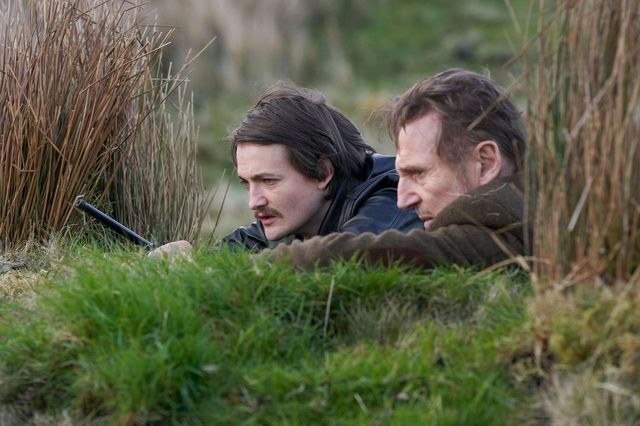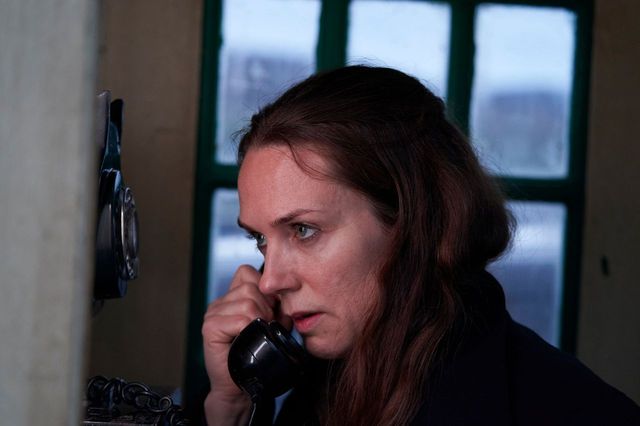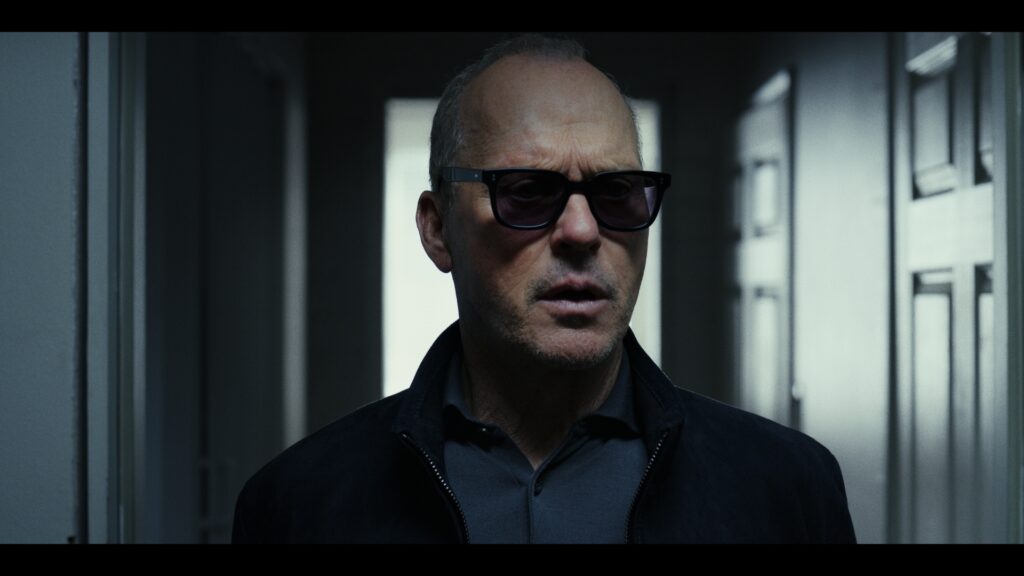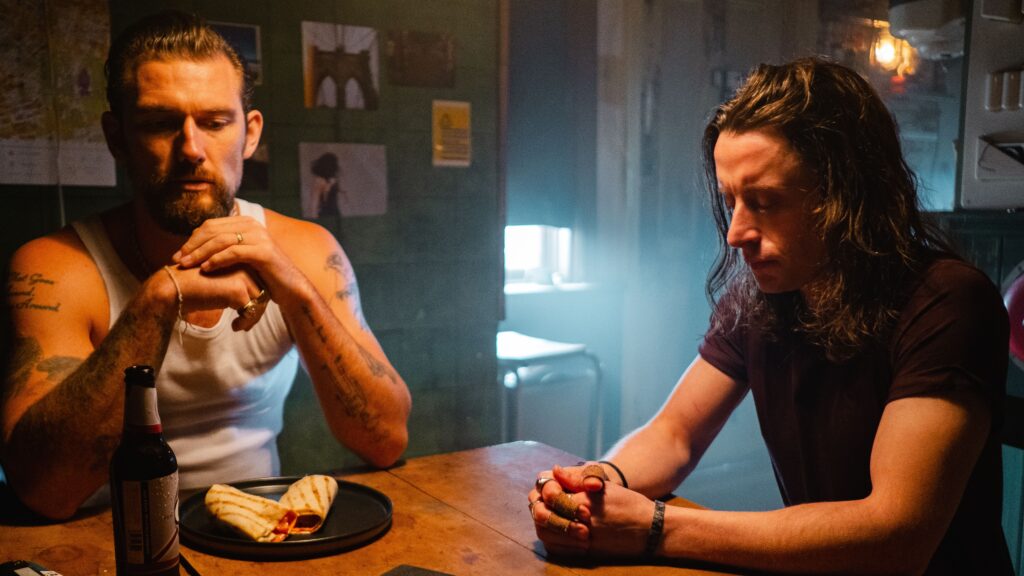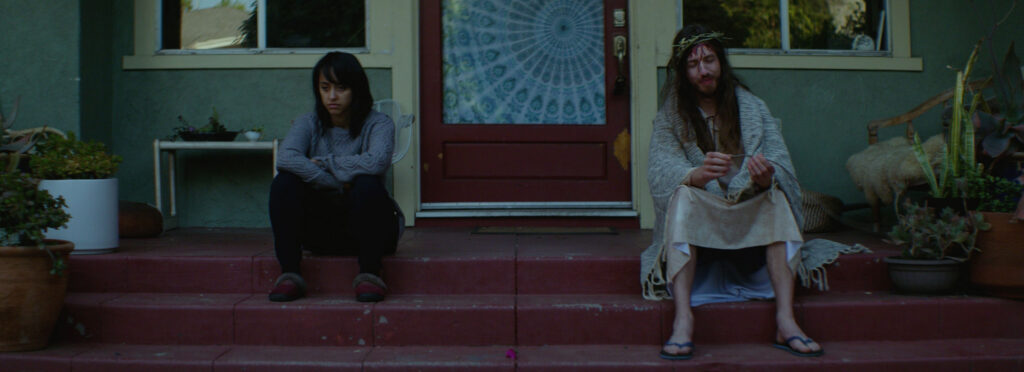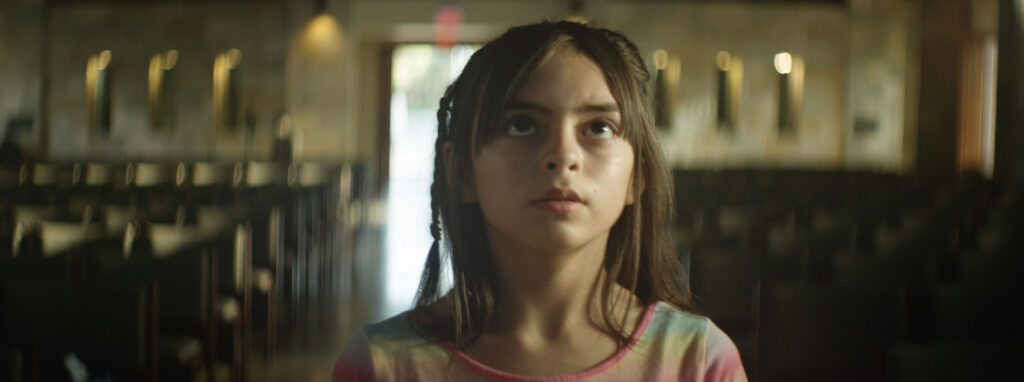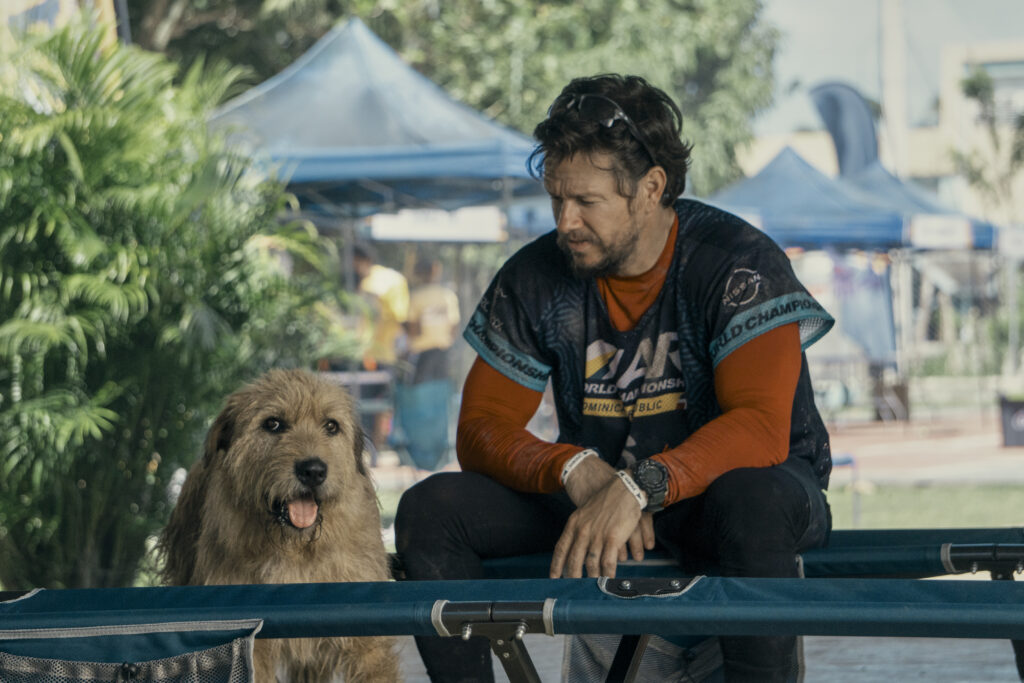April 6, 2024
by Carla Hay
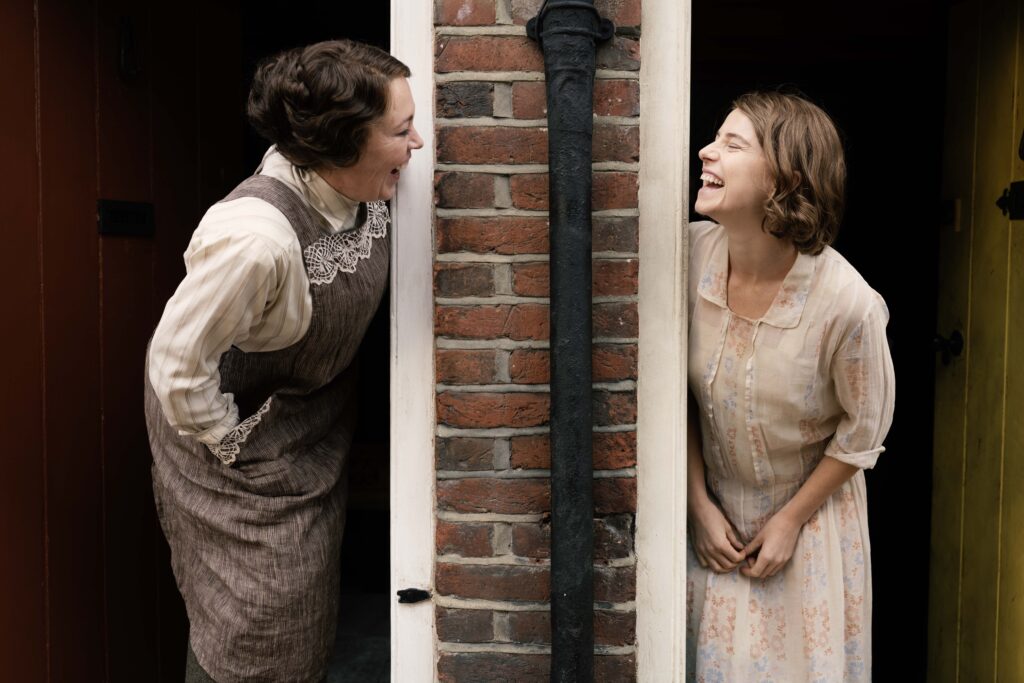
Directed by Thea Sharrock
Culture Representation: Taking place in the early 1920s, in Littlehampton, England, the comedy/drama film “Wicked Little Letters” (inspired by real events) features a predominantly white cast of characters (with a few Asians and black people) representing the working-class and middle-class.
Culture Clash: Two women, who have opposite personalities and who happen to live next door to each other, get into an escalating feud when one of the women is accused of anonymously sending hateful and obscene letters to the other woman and several other people they know in the area.
Culture Audience: “Wicked Little Letters” will appeal primarily to people who are fans of the movie’s headliners and well-acted satires about crime and discrimination.
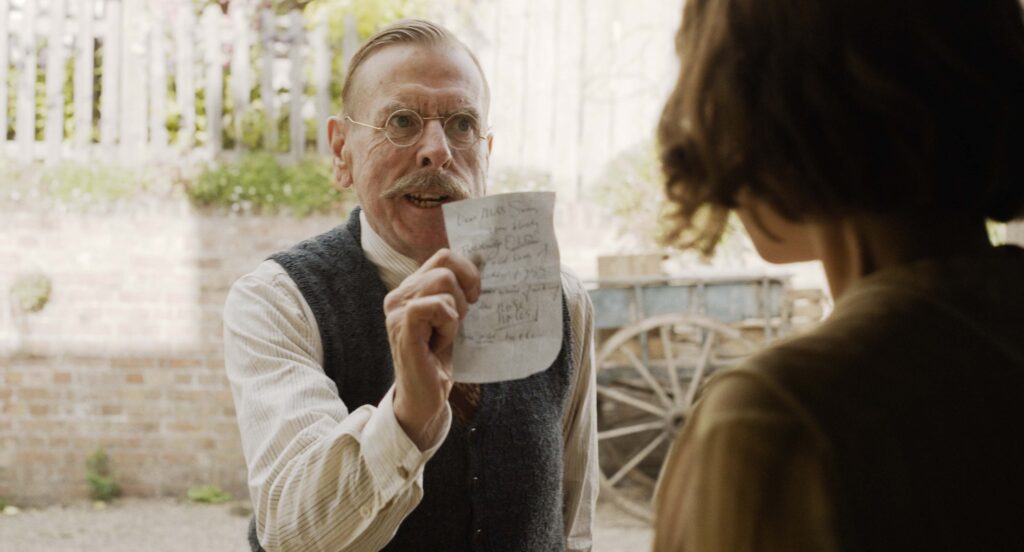
“Wicked Little Letters” not only has an accused libelous harasser on trial but this smart and funny satire also puts sexism, xenophobia and classism on trial. Top-notch performances give an incisive edge when the comedy gets too slapstick. The movie’s ending is a bit rushed, but the overall story should be enjoyable for viewers who like movies that poke fun at societal flaws and hypocrisies.
Directed by Thea Sharrock and written by Jonny Sweet, “Wicked Little Letters” had its world premiere at the 2023 Toronto International Film Festival. The movie is inspired by real events that took place in early 1920s England, when people in the small coastal town of Littlehampton were receiving anonymous, handwritten letters that had obscene insults directed at the letter recipients. “Wicked Little Letters” is partly a mystery about who is sending the letters and partly a send-up of how people react to the letters.
“Wicked Little Letters” also takes place in Littlehampton but condenses the real timeline of events from about three years to about a little over one year. The movie begins by showing that religious and conservative Edith Swan (played by Olivia Colman) has received the 19th letter in a series of obscene hate letters sent to her anonymously. Edith is a middle-aged, never-married bachelorette with no children. She lives in a townhouse with her parents: domineering and gruff Edward Swan (played by Timothy Spall) and passive and devoted Victoria Swan (played by Gemma Jones), who are understandably upset but the letters.
Edith shows this offensive letter to her parents. An outraged Edward wants to file a police report about these letters, but a reluctant Edith says she wants to avoid the embarrassment of making these letters public. Edith also says that whoever sent the letters deserves forgiveness and compassion. Eventually, Edward convinces Edith that they should file a police report because the only way for the letters to stop is to catch the culprit, and they need the help of law enforcement. Edith reluctantly agrees to give a statement to police.
Edward storms off the local police deparment and tells the investigating officer on duty about the letters. Constable Papperwick (played by Hugh Skinner) listens to what an angry Edward has to say and replies by saying that Constable Papperwick will fill out a form that will be filed for the police report. That response isn’t good enough for Edward, who thinks that Constable Papperwick isn’t taking the matter seriously. Edward insists that there should be a formal investigation.
Constable Papperwick relents and goes to the Swan home to do an interview with the Swans. Edward is quick to name the only person whom he thinks is sending the letters: a single mother named Rose Gooding (played by Jessie Buckley), who recently moved to the area from Ireland and who lives next door to the Swan family. Rose, who says her husband died in World War I, lives with her tween daughter Nancy (played by Alisha Weir) and Rose’s boyfriend (played by Malachi Kirby), who treats Nancy (who’s about 10 or 11 years old) and Rose with kindness and respect.
Edith then backs up the theory that Rose is sending the letters by telling Constable Papperwick more about why Rose is the most likely suspect. Rose and Edith actually started out as friendly acquaintances after Rose moved in next door. But some conflicts began to arise between the two women, who have opposite personalities.
The Swan family and Rose share a bathroom, which Edith says Rose often leaves in messy condition. Edith thinks that Rose is a foul-mouthed slob, while Rose thinks that Edith is an uptight prude. The Swan family also disapproves of Rose because she sometimes likes to have rowdy fun and get drunk at bars, which the Swans think is a very unladylike lifestyle.
Edith, who is nosy and judgmental, thinks it’s horrible that Rose dated several men before she began dating Bill. The Swans also don’t really approve of Rose because she’s Irish and an unmarried woman who’s “living in sin” with a lover. And it’s not said out loud in the movie, but it’s implied that because Bill also happens to be black, the Swans dislike that Rose and Bill are in an interracial romance.
At one point, someone anonymously called Child Protective Services against Rose. Nothing came of the CPS investigation, but Rose suspects that Edith is the one who called CPS to get Rose in trouble. All of these circumstances have made Rose the subject of gossip in the community, even before the obscene letters started being sent.
The tensions between Edith and Rose got worse during a birthday party for Edward, when a man at the party insulted Rose, and she punched him. This altercation ruined the party, and Edith put all the blame on Rose. Shortly after this party, Edith began receiving the obscene letters, which crudely accuse Edith of being promiscuous and kinky. The Swans tell Constable Papperwick that Rose is the only obvious suspect because she’s the only person they know who frequently curses like the curse-filled rants that are in the letters.
Constable Papperwick believes the Swans and immediately arrests Rose, who is charged with libel. Rose vehemently denies anything to do with the letters. Constable Papperwick and his boss Chief Constable Spedding (played by Paul Chahidi) think they have an easy open-and-shut case in proving that Rose is guilty. However, police officer Gladys Moss (played by Anjana Vasan), the only woman in the police department, is skeptical that Rose is guilty because there is no real evidence against Rose. Constable Papperwick and Chief Constable Spedding both think that doing a handwriting analysis is a waste of time and doesn’t count as evidence.
When Gladys expresses her concerns to Constable Papperwick and Chief Constable Spedding, these higher-ranking male cops are dismissive and condescending to Gladys in repeatedly sexist ways. Gladys suggests they should investigate further, because she thinks that Rose could be the target of a setup. Constable Papperwick sneers at her: “Woman officers don’t sleuth.” Chief Constable Spedding orders Gladys to stay out of the case. After Rose gets bailed out of jail, the obscene letters are sent to many more people in the community. And the scandal becomes big news in the United Kingdom.
In subtle and not-so-subtle ways, “Wicked Little Letters” shows the double standards that women face in society and how harsher judgments are placed on women if they do certain things that men are allowed to do without such judgment. Rose’s arrest is essentially because she does not conform to what this conservative community thinks a woman should be like: Rose sometimes gets drunk, she frequently swears, and she occasionally gets into fights to defend herself. A man doing the same things would not be condemned so severely.
Later in the movie, Rose finds out that Gladys is not allowed to marry and have children if she wants to keep her job as a police officer. It’s a sexist workplace rule that obviously doesn’t apply to men. When Rose asks Gladys why she wants to be a police officer, she says it’s because her father was a police officer, and she wants to do the work more than anything else. Gladys also has an adolescent niece named Winnie Moss (played by Krishni Patel), who also wants to become a police officer, and Gladys is mentoring Winnie.
The sexism doesn’t just come from men. An early scene in the move shows that Rose’s daughter Nancy likes to play acoustic guitar, but Rose tells Nancy, “Nice girls don’t play guitar.” (To her parental credit, Rose also tells Nancy to focus more on her academic studies.) On a more extreme level, Edith (who craves the approval of her strict and patriarchal father) has very bigoted ideas of what females should and should not do to be considered “respectable” and “feminine” in society.
“Wicked Little Letters” has some twists and turns in the story, which stays mostly faithful to the strange-but-true events that happened in real life. Although the names of the main characters have not been changed for the movie, some of the supporting characters were fabricated for the film. Rose finds some unlikely allies with three women who are Edith’s friends in a Christian women’s club that gets together to play cards: open-minded Mabel (played by Eileen Atkins), jolly Ann (played by Joanna Scanlan) and cautious postal worker Kate (played by Lolly Adefope), who is initially very suspicious of Rose.
“Wicked Little Letters” can get somewhat repetitive in showing how the odds are stacked against Rose. However, the investigation and the subsequent trial are intriguing and take comedic aim at the snobs in the community who are often hypocrites blinded by their own prejudices. The movie does not make adversaries Rose and Edith into caricatures. There are layers to Rose that show she’s a loving and responsible parent, not the unfit mother that she has been described as by her critics. Edith is also not quite as prim and proper as she appears to be.
Rose’s fiery personality and Edith’s reserved personality are seemingly at odds with each other. But Rose and Edith—just like Gladys—also share the common experience of being oppressed by sexism that wants to dictate or control how they should live their lives, simply because they are female. The heart of the film is in the admirable performances of Buckley, Colman and Vasan, who skillfully blend the film’s zippy comedy and the more serious drama. Amid the story about a criminal investigation and trial, “Wicked Little Letters” has poignant observations about female independence and female friendship—and what can be gained or lost under certain circumstances.
Sony Pictures Classics released “Wicked Little Letters” in select U.S. cinemas on March 29, 2024, with an expansion to more U.S. cinemas on April 5, 2024. The movie was released in the United Kingdom on February 23, 2024.







